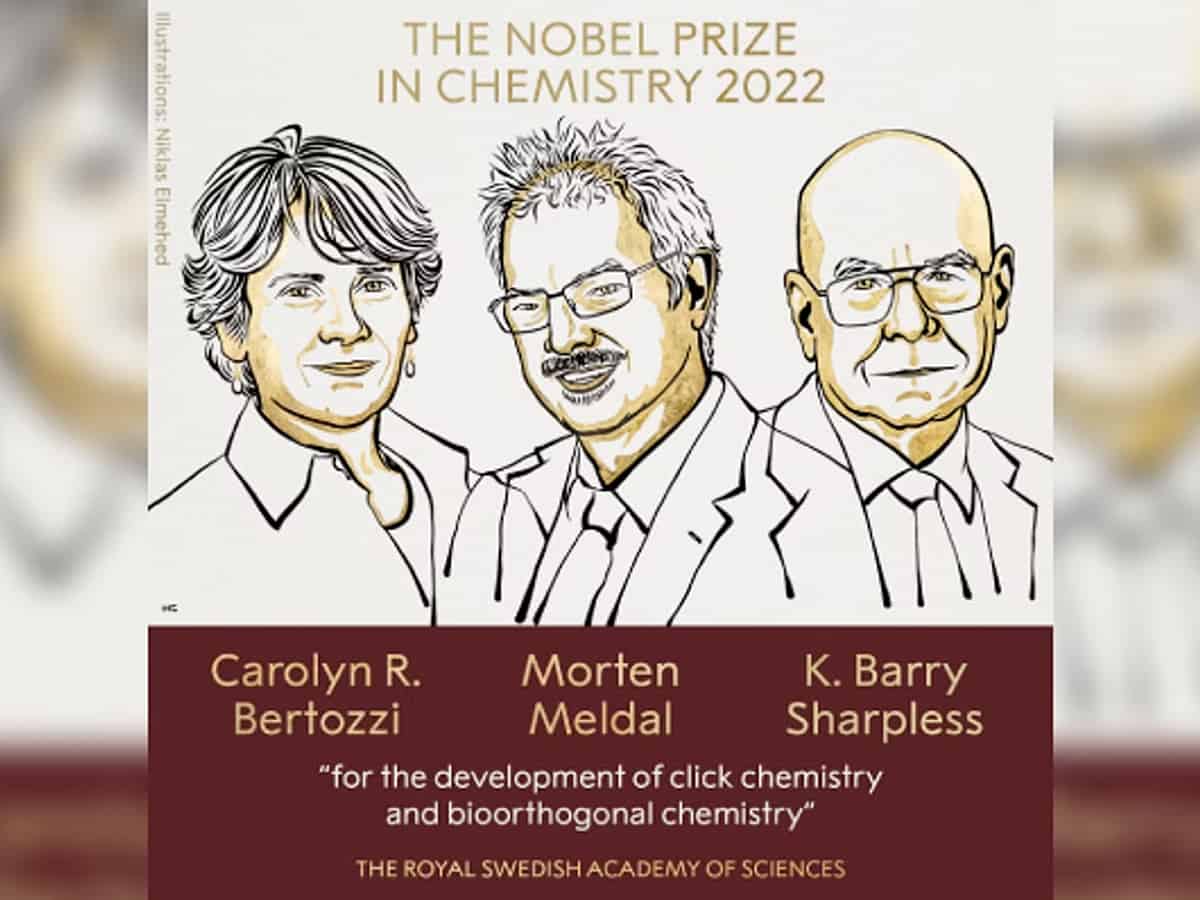
Every year, the week October 3-10 is the excitement over the announcement of the winners of the prestigious Nobel Prizes by the Committee based in Sweden. With one more edition done, disappointment for Indian science and India continues. No winners in 2022.
But, the Nobel Prizes-2022 produced a remarkable feat by the 81-year-old American Chemist, Barry K Sharpless by winning his second prize in the same subject. He shared the prize for Chemistry with Carolyn Bertozzi and Morten Meldal for their work on Click Chemistry.
Dr Sharpless is only the fifth individual in the 121 years old history of the Nobel Prizes, which were launched on the wish and corpus bequeathed by Alfred Nobel, the Swedish chemist who invented the dynamite and regretted its destructive power to win the prize twice. So, to make some amends, he is supposed to have committed his wealth for these prizes.
But, the all time high achiever among Nobel prizes is the Organisation—The Switzerland based, International Committee of the Red Cross has the distinction of being conferred the Peace Prize thrice—1917, 1944 and 1963. It was confounded by the Geneva based businessman Henry Dunant in 1863.
The rare gems
Now, for the surprising and rather trend setting feature, the first scientist ever to win two Nobel Prizes was a woman-Marie Curie. It was a spectacular feat as she won a prize in Physics in 1903 and for Chemistry in 1911.
That was a period when very few women were into research and everything was male dominated in the scientific world. However, it’s interesting to note that she came from a family of brilliant people, which has perhaps won the maximum number of the awards so far. Between them, Marie (2), Pierre and Irene Curie-1 each, they have won a total of four prizes in the sciences.
Marie and her husband Pierre won the Physics prize in 1903 along with Henri Becquerel for their work on radioactivity. In 1911, Marie achieved the extraordinary feat of becoming the first to win two prizes and in different subjects. She was the sole winner of the Chemistry prize for the discovery of radium and polonium. Irene Curie and her husband Fredric Joliot won the 1935 Chemistry prize for their discovery of artificially creating radioactive atoms.
The Second great achiever of a double in Nobel prizes was Dr Linus Pauling, the American chemist and peace activist. He won the Chemistry prize in 1954 for his work on the nature of chemical bond and its application to complex substances. In 1963, he got the prize for Peace as his crusade against nuclear weapons and war was recognised. He wrote a book titled No More War. He and his wife gathered the signatures of over 10,000 scientists on a petition opposing and asking for an end to nuclear weapons.
The third big achiever was Dr John Bardeen, who has the distinction of being the first person to win the prize twice in the same subject—Physics for the years 1956 and 1972. He continues to remain so, till this date. The American Physicist and Engineer shared the 1956 award with William Shockley and Walter Brattain for the invention of the transistor. In 1972, he shared with Leon N Cooper and John Robert Schrieffer for a more fundamental work on superconductivity.
Fredrick Sanger became the first person to win two Nobel prizes in Chemistry in 1958 & 1980. His first Nobel came for his pioneering work on the structure of protein. He later moved to DNA sequencing and shared the 1980 prize with Walter Gilbert and Paul Berg. His work has profound impact on understanding the action of Insulin too.
By winning the 2022 prize, Barry K Sharpless joins Sanger in winning two prizes in Chemistry in 2001 and 2022. He shared the 2022 prize with Carolyn Bertozzi and Morten Meldal for the ‘Click Chemistry’, in which molecular building blocks snap together quickly and efficiently. Sharpless coined the concept around 2000. It’s a form of chemistry, where reactions occur quickly and unwanted byproducts are avoided, said the release from the Nobel Committee.
In 2001, Barry shared the award with William S Knowles and Noyori Ryoji for developing the first Chiral Catalysts.
The India story
For India, there is always some excitement and interest but success has been very rare.
The first Indian to win the Nobel prize is Rabindranath Tagore for Literature in 1913 for his collection called Gitanjali.
In the field of sciences, Dr C V Raman continues to be the sole prize winning scientist, who is born in the country and worked too. He won the Physics prize in 1930.
Thereafter, three India born scientists have won the Nobel Prize. They are: Dr Hargobind Khurana for Medicine (1968); Dr Subramanyam Chandrasekhar for Physics (1983) and Dr Venkatraman Ramakrishnan for Chemistry(2009).
The British born, Dr Ronald Ross, won the award for Medicine for his work on malaria parasite, which he carried out in Hyderabad and Kolkata in 1901.
In Economics, Indian origin economists, Dr Amartya Sen (1998) and Dr Abhijit Banerjee (2019) have been winners.
In the category of Peace, the Child Rights activist, Kailash Satyarthi (2014) and the Albania born, Mother Teresa (1979), who made India her home, mission and service to the poor have been recognised with the award.
With each passing year of the Nobel Prizes, the question continues to linger on many people’s minds: When will India be a powerhouse for awardees and global quality research that gets recognised.



